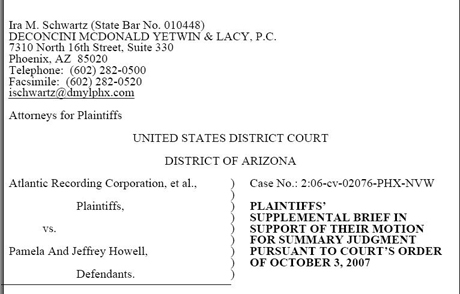What that RIAA/CD rip court brief really says

There's a lot of misinformation floating around the blogosphere about what exactly the (hiss, boo) Recording Industry Association of America is saying in a court brief about the very act of ripping your CDs, converting them to MP3s, and then storing them on your hard drive is illegal on the face of it.
Cory Doctorow of Boing Boing seems to be saying this. So does Nicholas DeLeon of CrunchGear, Matt Buchanan of Gizmodo, and even kdawson on Slashdot.
The thing is, they are all wrong.
Perhaps unlike them, I've actually read the entire brief. What I believe the RIAA is saying in the brief is that the sin is not ripping your CD, but storing them on your hard drive within a program already set up to launch illegal file trades.
To put it more directly, storing your ripped MP3's in, say, your "My Music" folder would be OK. But installing Kazaa, eDonkey, one of the torrents, or another P2P utility that can fish these files out and set them up for swapping is a bad bad thing.
Here's the gist of what the RIAA says:
The courts, too, have found that, even in the absence of proof that a copyrighted work has actually been fully transmitted to another, the section 106(3) distribution right is violated when a copyrighted work is made available for others on a peer-to-peer file sharing network. See A&M Records, Inc. v. Napster, Inc., 239 F.3d 1004, 1014 (9th Cir. 2001) (“Napster users who upload file names to the search index for others to copy violate plaintiffs’ distribution rights.”); BMG Music v. Gonzalez, 430 F.3d 888, 889 (7th Cir. 2005) (“[P]eople who post or download music files are primary infringers.”); Sony Pictures Home Entm’t, Inc. v. Lott, 471 F. Supp. 2d 716, 721-22 (N.D. Tex. 2007) (granting summary judgment to the plaintiff motion picture companies based on evidence that their copyrighted motion pictures were made available for download from the defendant’s computer); Motown Record Co. v. DePietro, 2007 U.S. Dist. LEXIS 11626, * 12-13, FN 38 (E.D. Pa. 2007) (“A plaintiff claiming infringement . . . can establish infringement by . . . proof that the defendant ‘made available’ the copyrighted work.”).
The keyphrase is, "made available."
So to stay out of harm's way, don't make infringing files "available." Don't install file-sharing software that can be triggered to exchange any infringing music files you have on your hard drive. If you have such software, delete it. And if you must continue to keep this software for whatever reason, disable its file-swapping capabilities.
I'm not a lawyer but I'd bet that following some or all of the advice I just imparted will keep the RIAA jackboots off your case.
